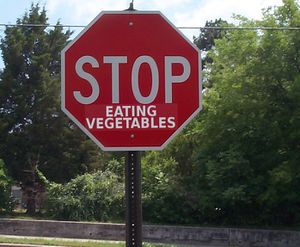Vegetable Rights
- For the treatment of human vegetables, see Terri Schiavo
Vegetable Rights are defined as undeniable rights possessed by plants and other non-animal living things. Vegetable rights activists believe in the natural rights of vegetables and other plant life. These groups oppose all forms of plant bondage and genocide, including the keeping of house plants (which are referred to as "slave plants" in the movement), vegetable gardens, family farming and commercial farming, landscaping, tree trimming, grass mowing, and public parks.
Although united in their opposition to the eating of plants, there are several subgroups of VR activists. Carnivores and meatatarians advocate the eating of only animal products, while others also abhor this practice on the grounds that plant bondage and genocide would be required to rear animals as well. Fungitarians only accept the eating of mushrooms and other fungi, as fungi are a parasitic and therefore have no rights, while junkitarians promote only eating non-lifeform-based products such as chewy plastics, styrofoam and things from McDonald's and vending machines. Noughtitarians eat nothing at all and die.
History[edit | edit source]
The vegetable and plants rights movement got its start in the wake of the many, many rights struggles of the '60s. Unaffiliated activists Herman and Olivia Thunk, called by some the Adam and Eve of vegatable rights, expressed dismay at not being able to play a pioneering role in any movement and sought out a previously unchampioned cause. This was more difficult that it sounds, and after several years and aborted efforts in the areas of animal rights, anti-nuclear, anti-coal, anti-solar, pro-coal, anti-humanitarian, pro-golf and hobbit rights, the pair settled on vegatable rights, and founded PETV, People for the Ethical Treatment of Vegatables. After a copyright lawsuit from PETA was filed in 1981, the group changed its name to PEESTOVE people for the Equal Ethical Sympathetic Treatment Of Vegatables Everywhere.
